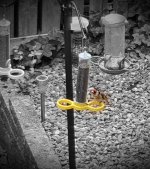Hi all. I'm totally obsessed with goldfinches. I have between 4 and 8 regular daily visitors. 4 of them don't have the red markings on their face yet, but the wing markings are clearly goldfinch ones with the beautiful yellow, black and white.
Do female goldfinches have the red markings on their face? I wonder if the ones I see are all juveniles. Some of them clearly show it by behaviour,e.g. they start to loudly demand to be fed by their parent, even if they're standing in front of the food!
Thanks, Francesco
Do female goldfinches have the red markings on their face? I wonder if the ones I see are all juveniles. Some of them clearly show it by behaviour,e.g. they start to loudly demand to be fed by their parent, even if they're standing in front of the food!
Thanks, Francesco






